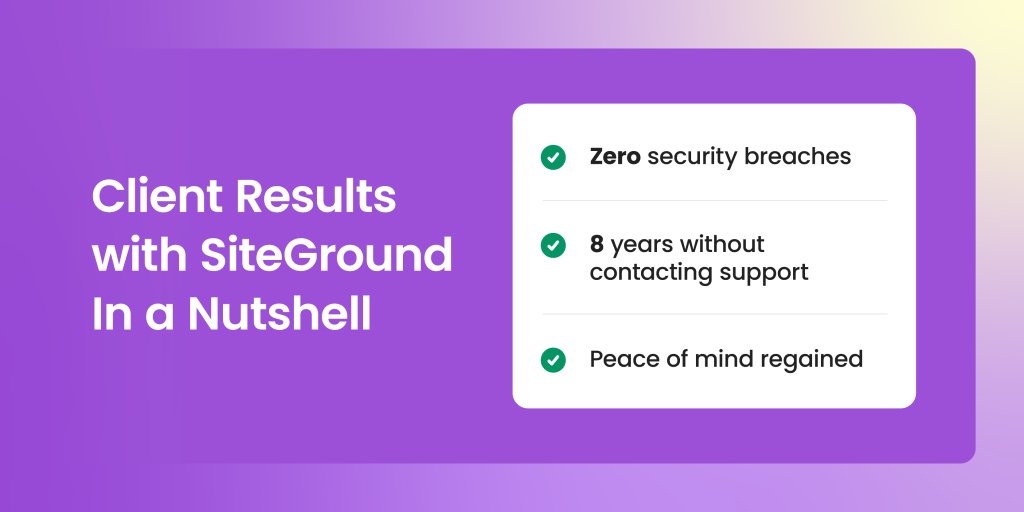From Weekly Hacking Attacks to 8 Years Without a Security Breach

You know that sinking feeling when a client messages you on a Saturday night saying their website is down? Or when you log in Monday morning to find three client sites have been hacked over the weekend?
That was life for a freelance web and UI/UX designer and illustrator Gellert Geszvein who runs AntaresArts.com – until switching to SiteGround changed everything.

The Moment Hosting Problems Outgrew the Business
Most freelancers follow the same path. You start with a few projects, teach yourself as you go, take on clients when they come. For years, it’s manageable – maybe a handful of sites to maintain, occasional updates, nothing too complicated.
Then things shift. The client list grows. Each new project means another website to maintain, another domain to manage, another hosting account to worry about. When you’re the one responsible for keeping everything running, every server issue becomes your problem to solve.
For Gellert, the turning point came when he and his family launched Sunnyhelps.com – an ecommerce site selling visual schedules and learning tools for toddlers and neurodivergent children. Suddenly he wasn’t just building sites for clients anymore. He was running his own online business, dealing with orders and customers and inventory, while still managing his client work.
“There are so many things we have to micromanage: orders, customer messages, new products, marketing activities. The server things shouldn’t be one of them.”
But server problems were exactly what he spent his time managing. And every hour fixing hosting issues was an hour not spent on actual client work or growing the business.
The Endless Hosting Shuffle
You know what nobody puts on their portfolio? The hosting shuffle. You start with one provider, things break, so you switch to another one your client swears by. Then that one has issues. So you try another.
“I have worked with almost every major hosting provider in the past and numerous smaller ones from Europe and North America. The experience was never flawless and I never felt like I had arrived and could forget about the servers. I spent years searching and trying.”
The problems never really changed:
- Support was nearly impossible to reach. Getting through could take an hour. Sometimes multiple attempts just to reach someone. Then you’d explain the issue, wait, explain it again to someone else, wait more. Meanwhile, your client’s business was offline.
- Sites broke without warning. An update would push through, and suddenly a site wouldn’t load. Or a backup restore would fail. Or a domain connection would drop. Never at convenient times.
Every incident cost billable hours. Time Gellert couldn’t bill for, time his clients lost, time that should have gone into actual design work or growing his business.
“It was very difficult to contact support, took a long time to get through, and in many cases it took several attempts. This meant a lot of inconvenience and wasted time for me and for my customers.”
When you’re building a reputation as someone clients can rely on, unreliable hosting becomes your problem. Customers don’t distinguish between a hosting failure and your failure – it all reflects on you.
Website Security – the Hosting Issue You Can’t Ignore
The hosting shuffle might have continued indefinitely – annoying but manageable – except for one thing: security breaches.
If you’ve ever had a client site get hacked, you know the panic. The emergency calls, the scramble to restore backups, the explanations to angry clients. Now imagine that happening repeatedly across multiple sites, despite every protection plugin and security solution you can find.
For clients running actual businesses – ecommerce sites processing transactions, service companies managing customer data, agencies with reputations on the line – these attacks aren’t just technical inconveniences. They threaten revenue, destroy customer trust, and can shut down operations entirely.
That’s when one of Gellert’s clients mentioned SiteGround Web Hosting. After researching the platform, Gellert decided to move the most vulnerable sites to more secure infrastructure. At that point, he’d tried everything else.
The expectation was straightforward: fix the security problem. Nothing more.
What happened went beyond that.
The SiteGround Difference
Migrating the website to SiteGround did solve the hacking problem. But it also fixed issues Gellert had spent years accepting as “just how hosting works.”
The Attacks Stopped. Completely.
Not “reduced” or “mostly prevented.” Zero successful hacking incidents since transferring to SiteGround. The security crisis that had driven the switch simply stopped being an issue. SiteGround’s security system handled threats automatically in the background – without Gellert needing to manage any of it.
Site Management Finally Made Sense
This part was unexpected. After years of wrestling with clunky control panels and unclear interfaces, Site Tools – SiteGround’s website management interface – actually made sense.
“The Site Tools user interface is so easy to use yet comprehensive that I can easily do anything. Somehow all the features are right where I would look for them and as easy to use as can be.”
Coming from someone who designs UI/UX professionally, that’s not a casual observation. Site Tools demonstrated how website management should work – intuitive enough for beginners, comprehensive enough for professionals.
PHP updates happened instantly. New site setups ran smoothly. Domain configurations worked on the first try. The technical tasks that used to require support tickets or hours of troubleshooting just worked.
Support Stopped Being Necessary
Here’s the most unexpected part:
“I have never had to use SiteGround support, ever!”
Over eight years, Gellert has done full website resets, complex database work, site migrations between servers, and multiple domain changes. Never once needed to contact support.
When he did need guidance on specific technical configurations, SiteGround’s documentation (the knowledge base and tutorials) had clear, current instructions. The articles were actually useful – written by people who understood the technical problems he needed to solve.
The value of a support system, it turns out, isn’t just about having someone available when things break. It’s about building a platform that rarely breaks in the first place.
The Invisible Business Win
There’s a business impact here that’s hard to put in a spreadsheet but impossible to ignore.For any client site hosted on SiteGround, server management disappeared from Gellert’s mental task list. Setting up domains, configuring email accounts, managing SSL certificates – all of it became fast and forgettable in the best possible way. These things worked, then faded into the background where infrastructure belongs.
“SiteGround saves a lot of time and effort whether I’m looking at it from my clients’ side or as a service provider.”
The constant low-grade anxiety – “what’s going to break this week?” – was gone. That mental bandwidth freed up actually mattered. More focus on design work. More capacity for new client projects. More energy for growing both AntaresArts and Sunnyhelps without worrying about adding technical liability with every new site.
That’s the transformation that doesn’t show up in feature comparison charts.
What This Means for Freelancers and Business Owners
Eight years in, Gellert hasn’t looked back. No emergency switches when something breaks. No reason to look elsewhere.
He recommends SiteGround Web Hosting to every new client now – not because he’s selling it, but because he’s tested nearly every alternative and knows what they cost in time, stress, and lost weekends.
- For freelancers managing multiple client sites like Gellert does, reliable hosting means spending time on billable work instead of emergency fixes.
- For business owners running their own sites while juggling client work, it means reclaiming the hours that used to disappear into troubleshooting.
Nobody starts a business thinking “I can’t wait to spend my evenings troubleshooting server issues.” But somehow that’s where a lot of us end up.
Unless your hosting just works. Then you get to do what you actually signed up for: building, creating, growing. Join millions of businesses doing just that with SiteGround.





Comments ( 0 )
Thanks! Your comment will be held for moderation and will be shortly published, if it is related to this blog article. Comments for support inquiries or issues will not be published, if you have such please report it through our official channels of communication.
Leave a comment
Thanks! Your comment will be held for moderation and will be shortly published, if it is related to this blog article. Comments for support inquiries or issues will not be published, if you have such please report it through our official channels of communication.